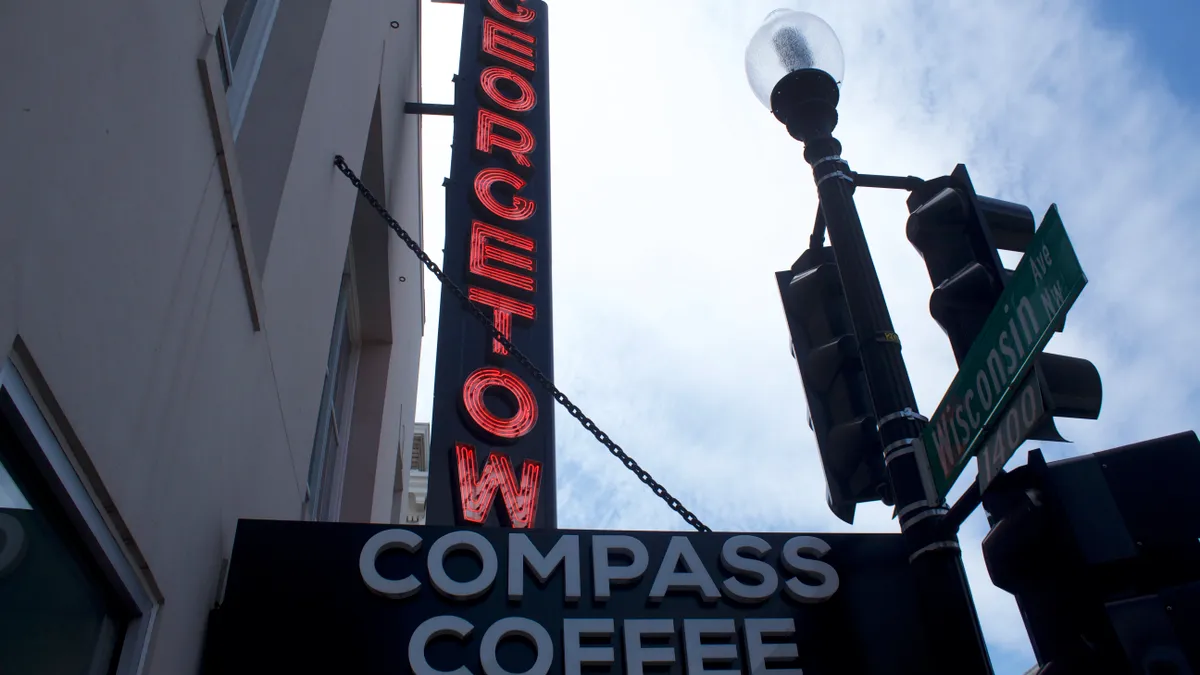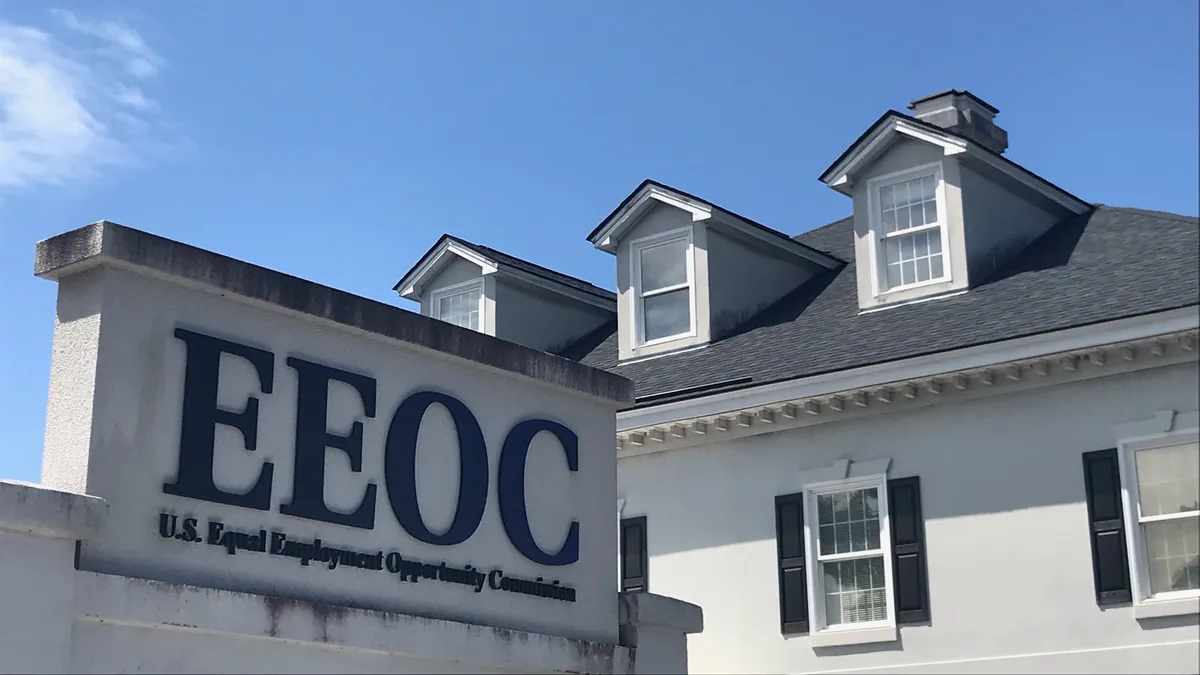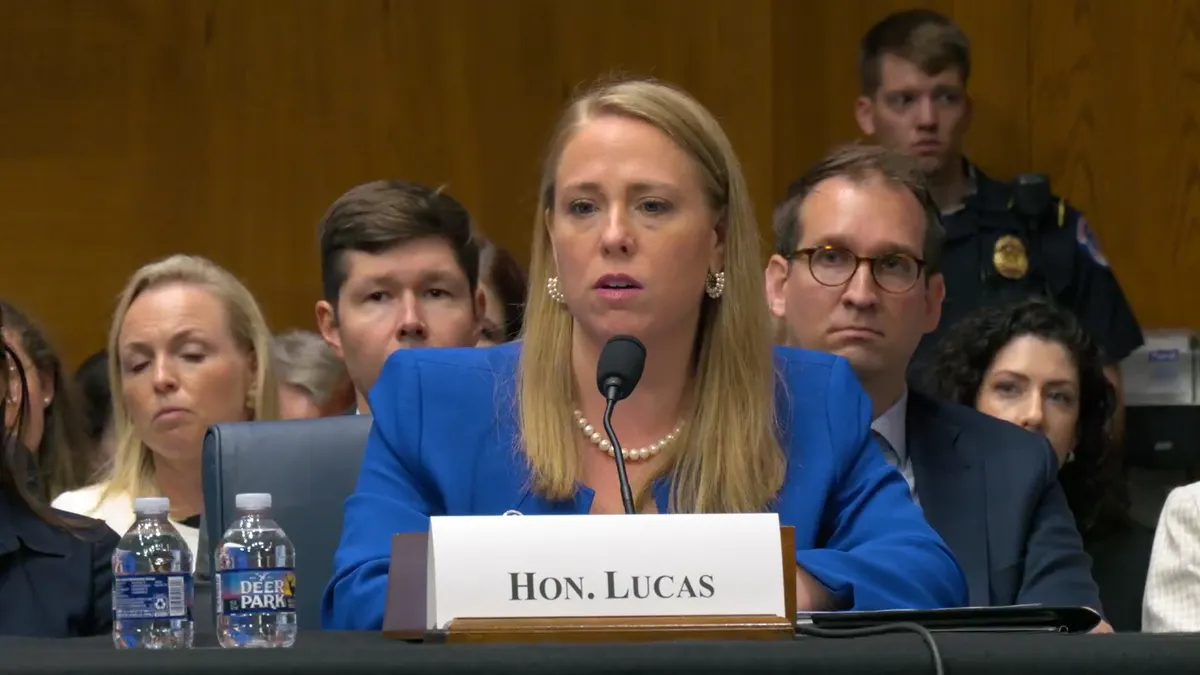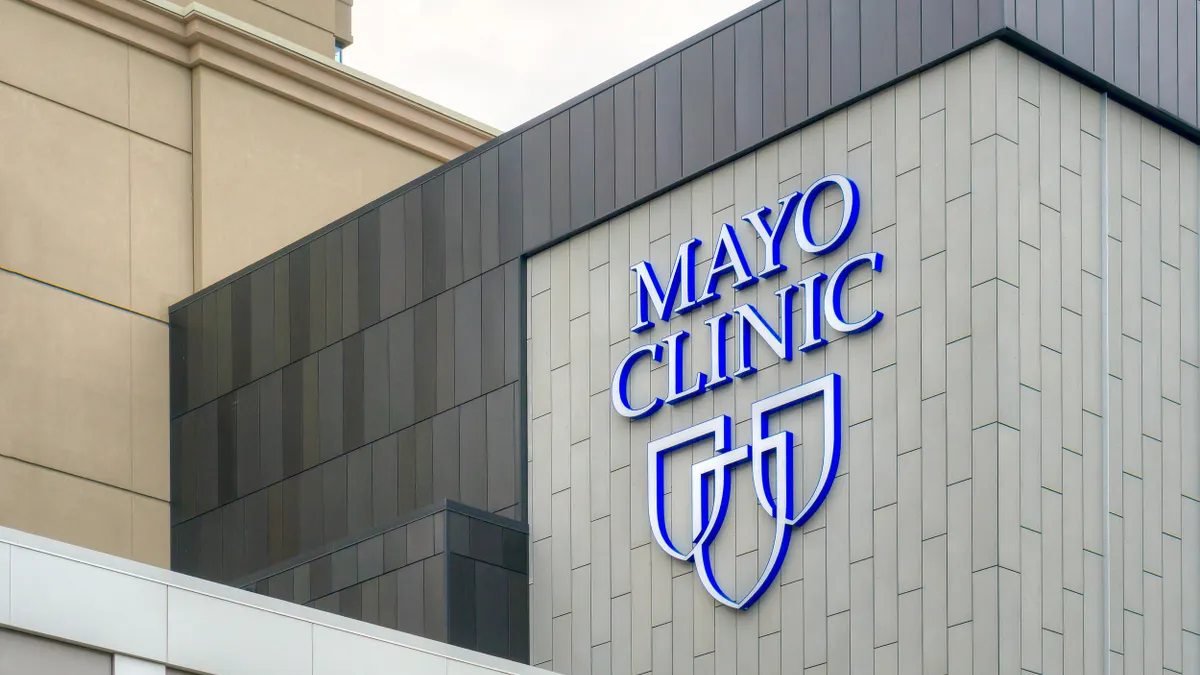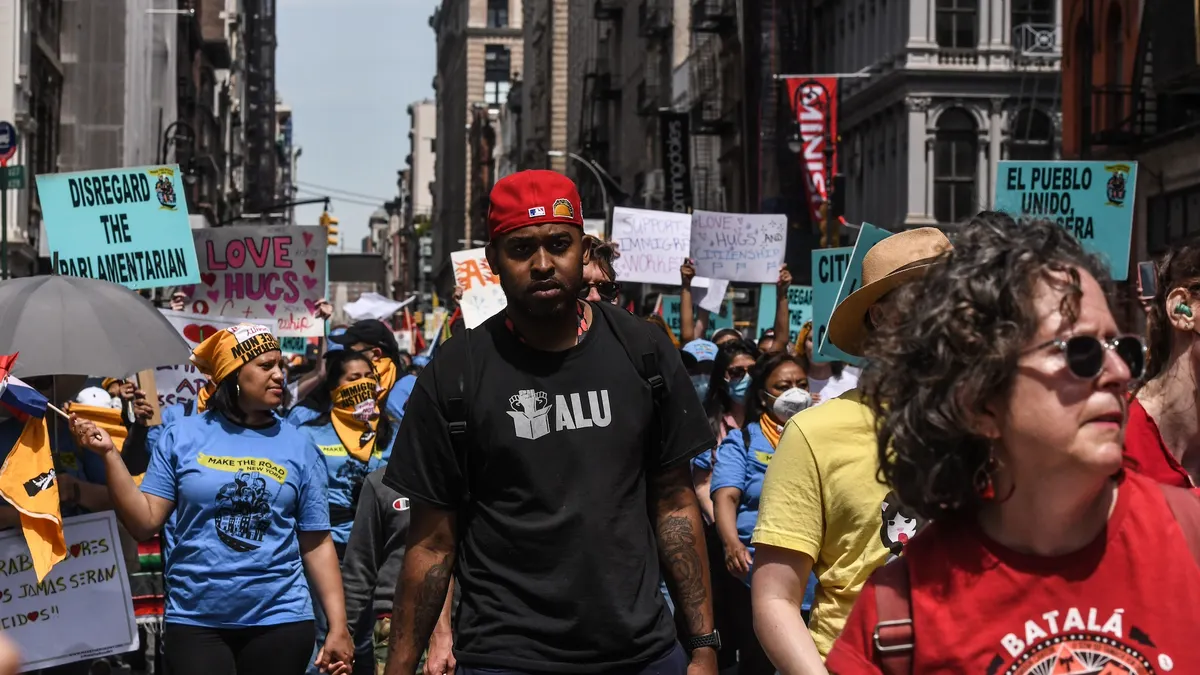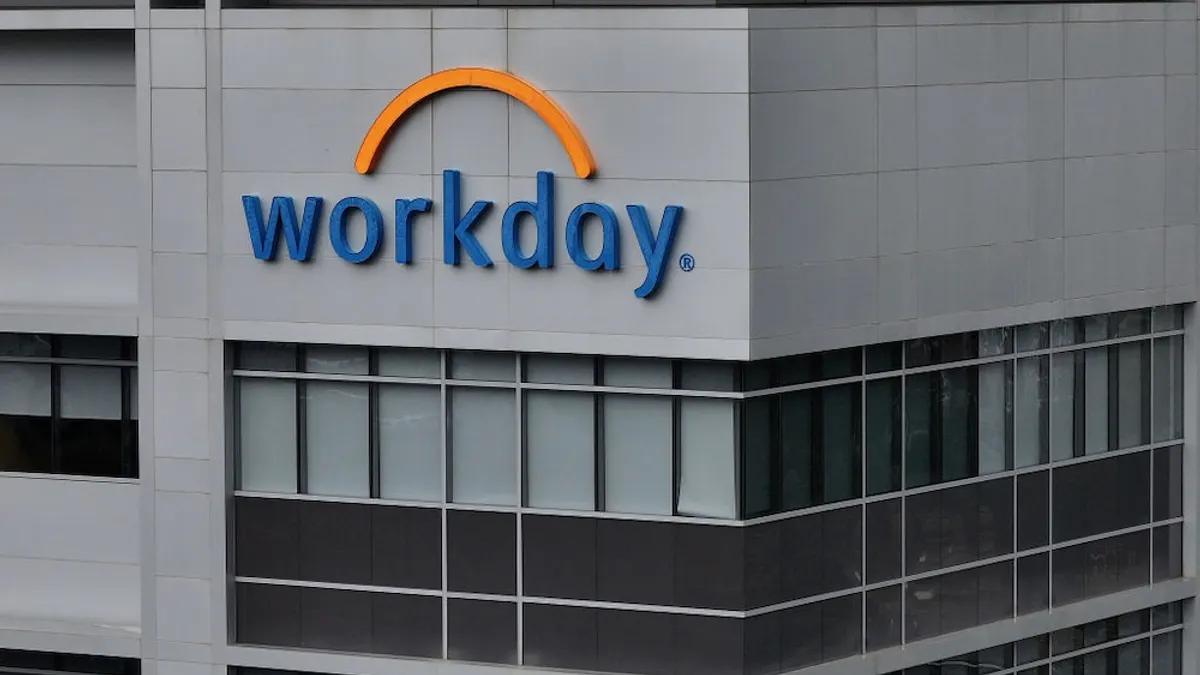On May 31, workers at some of Compass Coffee’s 18 cafes launched a public union drive at the regional coffee chain. On June 4, Workers United, the union supporting the organizing drive, submitted petitions to the National Labor Relations Board for elections at seven cafes in five bargaining units with 47 employees.
In the second week of June, management at the Washington, D.C.-based company began adding scores of workers, including executives of other companies, said Joseph Babin, a member of the organizing committee and shift supervisor at Compass.
On June 19, Compass CEO Michael Haft told Restaurant Dive there were about 100 workers at the seven cafes.
However, Compass told the NLRB and Workers United that the seven cafes have 167 potential voters.
“If [the employer] is saying that a cafe that everyone expects to have 15 to 25 employees actually has 50 employees, that’s a stretch,” said John Logan, chair of the labor and employment studies department at San Francisco State University’s Lam Family College of Business.
Many of the workers named by Compass as prospective voters appear to have been hired recently, and some are not hourly cafe workers. Some have worked shifts as baristas, according to shift supervisors who worked alongside them. Both the scale of the hiring and the inclusion of individuals who are not baristas or barista apprentices could raise problems ahead of the upcoming union election, which is scheduled for July 16.
Tyler Hofmann, a staff organizer at Workers United, said the union plans “on challenging voters who we have reason to believe have not worked any shifts at these locations, and the many people brought in specifically to dilute the vote.”
Among the Compass documents listing potential voters is Jacob Tyner, who — according to his LinkedIn profile — is general counsel to the U.S. Sen. Dan Sullivan (R-Alaska).
Restaurant Dive confirmed Tyner’s identity by comparing the information on the Compass list and on LinkedIn with information from the Maryland Bar and the George Mason Chapter of the Sons of the American Revolution. Neither Tyner nor Sullivan’s office responded to requests for comment by press time.
Others on the Compass list of eligible voters include Graham McLaughlin, president of snack food brand Snacklins and former candidate for D.C’s at-large city council seat, and Cullen Gilchrist, founder and CEO of Union Kitchen, a D.C.-based food business accelerator that recently engaged in a protracted battle with UFCW Local 400 over union representation.
McLaughlin said he had never worked a shift at Compass and was not employed by Compass.
“I helped them out on a training one time,” he said. “So that’s probably why I’m on there. But I’ve never done a shift or anything.” McLaughlin said he was not voting in the election.
In an interview with Restaurant Dive, CEO Haft said Gilchrist is a close acquaintance and business associate. Haft is a board member of Gilchrist’s Union Kitchen. Gilchrist did not respond to requests for comment by press time.
Haft added that workers in high-turnover industries with many small workplaces, like coffee shops, did not need unions.
Haft said, “My strong preference is that we don’t need a union to represent baristas,” and workers dissatisfied with the company “might be better off going somewhere else.”
Tizzy Brown was also on the Compass list. She works in national partnerships and federal affairs for Uber and was not employed by Compass on June 18, when the list of voters was presented to Workers United and the NLRB, according to a letter Compass sent to Brown on June 19.
Brown, in an email to Restaurant Dive, said she had attended a training hosted by Compass on June 9 because she was interested in potentially working with the company part time. Brown signed some paperwork at the event and was added to Compass’ system as an employee.
Per Compass’ letter to Brown, however, she’d been removed from the company’s system effective June 9. “I never worked a shift beyond that initial training, and as soon as this all came to light I reached out to Compass and asked to ensure I was removed from their employment system,” Brown said.
Haft declined to discuss specific individuals’ employment, or lack thereof, by Compass Coffee, citing privacy concerns.
David Rosenfeld, a labor lawyer at Weinberg, Roger and Rosenfeld, said that claiming people who don’t work at a company are workers there is uncommon in NLRB elections.
“If it were true, it’s totally bizarre, unreal, crazy,” Rosenfeld said. “I’ve never heard [of] an employer being this egregiously stupid.”
Rosenfeld said that packing the bargaining unit the way Compass allegedly has would make it easy for the union to succeed in challenging ballots or in getting an election re-run.
Who gets to vote is not yet certain
Normally, Logan said, the NLRB tries to determine “a community of interest” among workers when looking to establish the appropriate bargaining unit for an election.
It’s fairly common for larger employers to try to swamp a bargaining unit with new hires, or by drawing in additional job classifications and departments of workers already employed by the company, Logan said, but such a strategy was uncommon at a smaller employer, such as a regional coffee chain.
Parties to NLRB elections frequently challenge ballots cast by workers they believe are not members of bargaining units. In some cases, this comes down to job duties: Managers with hiring and firing power are barred from voting. Shift supervisors with limited supervisory duties, such as Babin and Penina Meier-Silverman, another pro-union shift supervisor, are not always excluded, and because of this ambiguity they frequently vote in union elections.
If the number of challenged ballots is enough to affect the outcome of an election, the NLRB’s regional office holds a hearing to determine voter eligibility and then counts the eligible ballots.
In an email to Restaurant Dive, Haft said that the final voters would be determined through a collaborative process between the NLRB, Workers United and Compass on July 14, a couple days before the scheduled election, though he does not expect Workers United to challenge the list.
“We believe all employees of Compass Coffee at the locations that have been petitioned are eligible,” Haft wrote. “The list reflects the current employees at the time of the vote.”
According to an election agreement between Compass and the union, workers employed at Compass in the payroll period ending July 14, as well as those averaging four or more hours per week in the quarter leading up to that date, are eligible to vote.
Some of the workers on the list, Haft said, are transfers from other stores. Many, Haft said, are new hires he said were necessitated by seasonal fluctuations in employment at locations near colleges.
Compass Coffee, according to Haft, is “busiest during the warmer months, which we refer to as ‘cold brew season,’ so there is always an annual uptick in employment this time of the year. As a retail business [that] survived COVID-19, we are grateful to finally see it trend in this direction.”
However, on June 19, Haft showed Restaurant Dive records indicating that foot traffic at Compass locations in downtown Washington D.C., including one union location, lagged behind June 2019 foot traffic by more than 50% on comparable days.
Kolyo Kolev, a shift supervisor at the Georgetown location on Wisconsin Avenue, and a union supporter, said that his location was “in one of its slowest phases.” Despite this, Kolev said, staffing at Georgetown has swelled dramatically compared to the period before the union drive.
“Today, we had six people working the floor. During a weekday that's kind of unheard of,” Kolev said on June 20. “Normally, we have maybe four max, four to three.”
Some workers, Haft said, were hired to backfill vacancies created when Compass staffed two new cafes with experienced baristas and others were hired to train in preparation for future growth. Haft said the company puts new hires through a Coffee Academy, inspired by his time in the U.S. Marine Corps, to prepare new hires to work as baristas.
Kolev said shift supervisors consistently asked the company to improve staffing before the union drive to no avail.
“My manager would always get like, there's not enough money in the budget, or like some sort of reason not to hire more people,” Kolev said. That changed in early June, according to Kolev.
New hires put through group interviews, hired en masse
Briana Adams, who was a manager at Compass’ Wisconsin Avenue location until June 17, said the new hires who have been joining cafes recently were not hired through the company’s normal process, which requires one-on-one interviews with a cafe manager.
Instead, Adams said, the new hires were put through group interviews and hired en masse by one of the company’s executives.
“They just sent them wherever was unionizing because none of the cafes that were not trying to unionize got anybody added to their schedule,” Adams said. “I believe it was to dilute the union vote so that they could have more No [votes] than they did Yes [votes].”
Adams said the Wisconsin Ave location normally operated just fine with nine or 10 employees on its overall roster.
Adams said she was fired after she was asked to discipline a worker for discussing the union with co-workers and customers. Rather than issue the write up, Adams said, she asked her supervisors if she could speak with the company’s lawyers to make sure the disciplinary action wouldn’t be a violation of labor law.
One of the shift supervisors under Adams, Penina Meier-Silverman, said the company began limiting shift supervisors’ ability to see who was scheduled to work a shift at the company’s Wisconsin Avenue location and that some new hires were showing up without managers or supervisors at the cafes knowing they were scheduled or that they were there to train.
Kolev said new hires were showing up not knowing what was going on at all.
“I definitely did not need 16 people added to my schedule,” Adams said.



